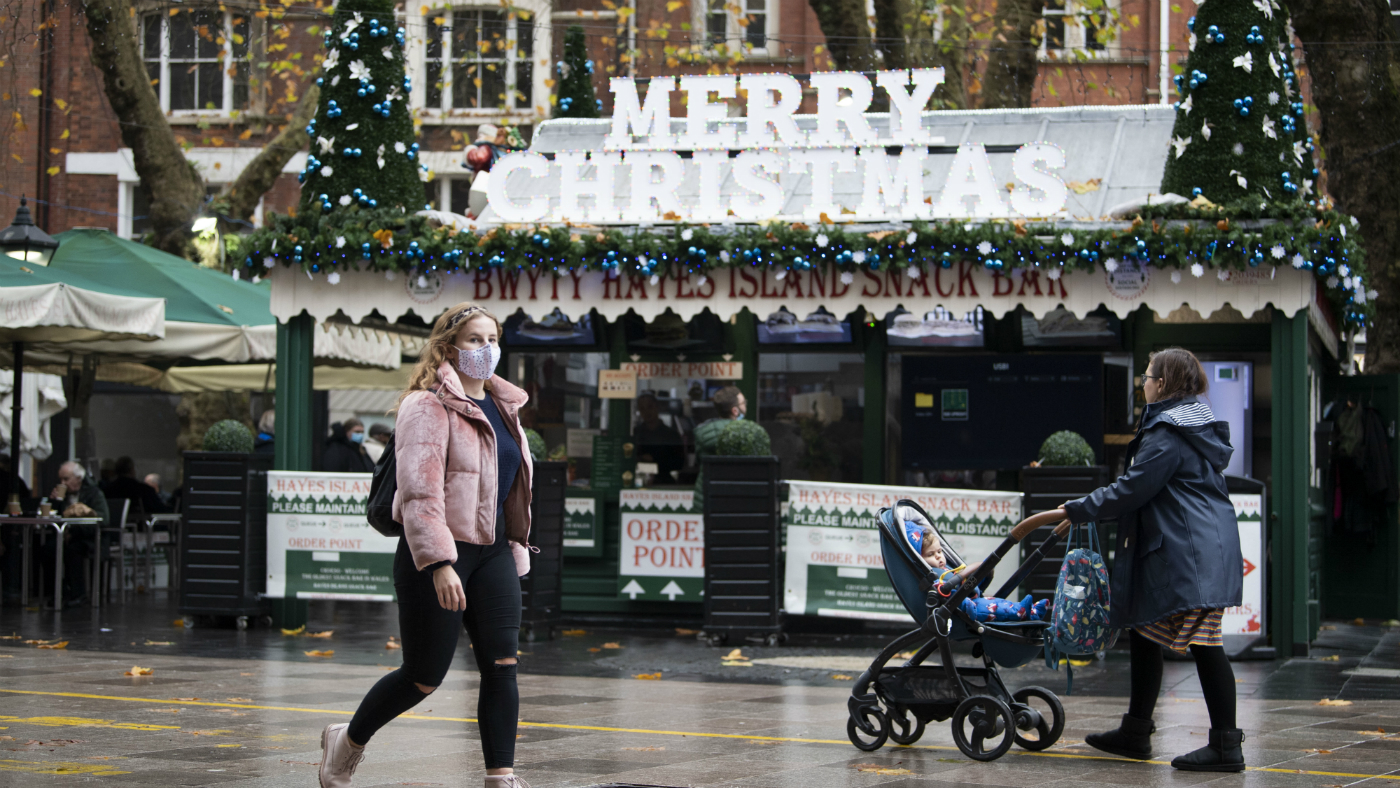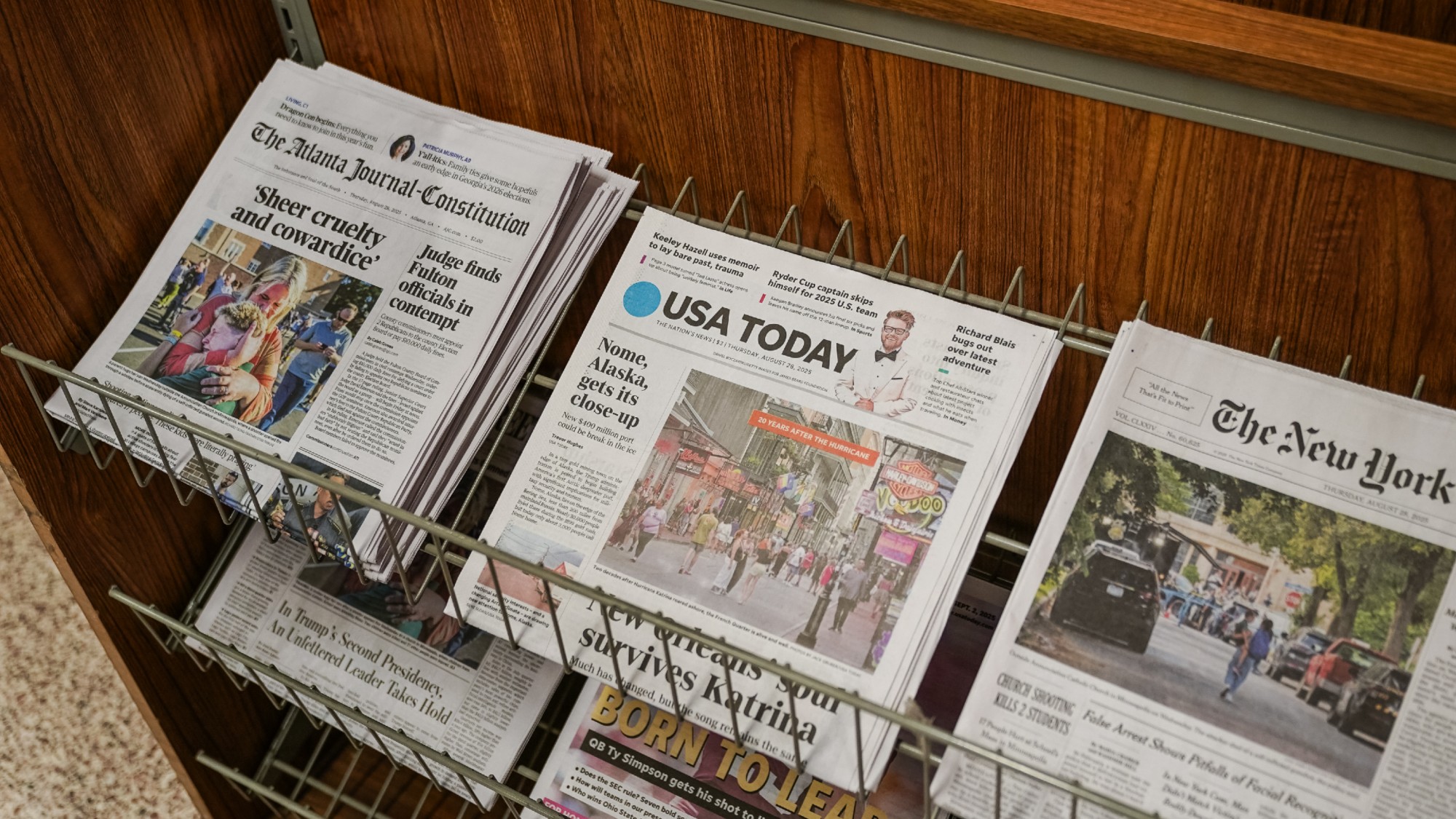What is the science behind the Christmas Covid break - and will the let-up cost lives?
Some experts fear that allowing households to mix over festive season risks ‘pouring fuel on the coronavirus fire’

A free daily email with the biggest news stories of the day – and the best features from TheWeek.com
You are now subscribed
Your newsletter sign-up was successful
Family festive celebrations are back on the agenda following a relaxation of coronavirus restrictions to allow three households to get together in “Christmas bubbles”.
No. 10 announced last night that between 23 and 27 December, these “exclusive” groups will be able to meet at home, outdoors or in places of worship, with travel across the country also permitted.
However, leaders from England, Scotland, Wales and Northern Ireland are urging the public to “think carefully about what they do” in order to limit the spread of Covid-19, as some experts caution against inter-generational mixing, the BBC reports. Other scientists are going a step further, warning that the let-up could “spark another wave of infections and further deaths”, the broadcaster adds.
The Week
Escape your echo chamber. Get the facts behind the news, plus analysis from multiple perspectives.

Sign up for The Week's Free Newsletters
From our morning news briefing to a weekly Good News Newsletter, get the best of The Week delivered directly to your inbox.
From our morning news briefing to a weekly Good News Newsletter, get the best of The Week delivered directly to your inbox.
‘Tis the season to be jolly careful
The Christmas “amnesty” plans were agreed by the first ministers of the devolved administrations in Scotland, Wales and Northern Ireland during a meeting chaired by Cabinet Office Minister Michael Gove on Tuesday.
Public Health England’s Dr Susan Hopkins had cautioned days earlier that the likely trade-off of any relaxation of the rules would be “heavy restrictions before and after Christmas”, The Telegraph reports. That prediction has been proved correct, with Tory MPs now lining up to attack plans for a tougher post-lockdown tier system to facilitate the festive freedom.
But Gove “struck an upbeat tone” after the Christmas-time easing was announced, saying the move will “offer hope for families and friends who have made many sacrifices over this difficult year”, the Daily Mail says.
A free daily email with the biggest news stories of the day – and the best features from TheWeek.com
Scientists have been debating the extent of the possible risks involved in the morale-boosting plan since it was first proposed in October.
Imperial College London epidemiologist Professor Neil Ferguson, who spearheaded the first UK lockdown, told BBC Radio 4’s Today programme last month that while “some people will die because of getting infected” over Christmas, “if it is only one or two days, the impact is likely to be limited”.
University College London (UCL) professor Christina Pagel, a member of the government’s Scientific Advisory Committee for Emergencies (Sage), agrees that as long as precautions are taken beforehand, people should be able to celebrate Christmas relatively normally.
Speaking about how she intended to spend the break, Pagel told The Guardian that “our plan is to be extra careful (no meetings outside the household) the ten days before Christmas so we can then celebrate with my parents, who are both in the extremely vulnerable category”.
Tidings of misery
Not all experts are convinced by the optimistic assessments of Gove and other supporters of the easing of the rules. Sage member Professor Andrew Hayward, director of the UCL Institute of Epidemiology and Health Care, has argued that the Christmas plan amounts to “throwing fuel on the Covid fire”.
Hayward told BBC Newsnight that any relaxation of Covid restrictions, especially those relating to household mixing, “will definitely lead to increase transmission and likely lead to third wave of infections with hospitals being overrun, and more unnecessary deaths”.
“Covid- 19 is a disease that thrives on social contact - especially the sorts of close proximity, long duration contact that you have in relaxed circumstances within a household,” he added. “I think the danger is, with a vaccine on the way, if we are not very careful over Christmas we are really in danger of snatching defeat from the jaws of victory on this on.”
That warning has been echoed by British Medical Association UK council chair Dr Chaand Nagpaul, who told Sky News that coronavirus “does not discriminate against certain days of the year”.
“Relaxing the rules on indoor mixing for a five-day period will almost certainly carry the risk of a rise in infection rate,” he said.
Scientists overseas have come to a similar conclusion, with US health experts warning ahead of Thanksgiving “that all it takes is one infected person to create an outbreak”, CNN reports.
Citing evidence from funerals and weddings, the broadcaster adds that “evidence of such coronavirus spreads has already been seen in many parts of the country this year”.
In a paper published earlier this year in the US National Library of Medicine, infectious disease experts Thomas Frieden and Christopher Lee wrote that superspreading events (SSEs) “are associated with both explosive growth early in an outbreak and sustained transmission in later stages”.
“Targeted and rapidly implemented public health interventions to prevent and mitigate SSEs are critical” in both the early and containment stages of the pandemic, the paper continues - a warning that highlights the potential danger of taking a foot off the pedal over Christmas.
-
 At least 8 dead in California’s deadliest avalanche
At least 8 dead in California’s deadliest avalancheSpeed Read The avalanche near Lake Tahoe was the deadliest in modern California history and the worst in the US since 1981
-
 Political cartoons for February 19
Political cartoons for February 19Cartoons Thursday’s political cartoons include a suspicious package, a piece of the cake, and more
-
 The Gallivant: style and charm steps from Camber Sands
The Gallivant: style and charm steps from Camber SandsThe Week Recommends Nestled behind the dunes, this luxury hotel is a great place to hunker down and get cosy
-
 Local elections 2026: where are they and who is expected to win?
Local elections 2026: where are they and who is expected to win?The Explainer Labour is braced for heavy losses and U-turn on postponing some council elections hasn’t helped the party’s prospects
-
 How corrupt is the UK?
How corrupt is the UK?The Explainer Decline in standards ‘risks becoming a defining feature of our political culture’ as Britain falls to lowest ever score on global index
-
 The high street: Britain’s next political battleground?
The high street: Britain’s next political battleground?In the Spotlight Mass closure of shops and influx of organised crime are fuelling voter anger, and offer an opening for Reform UK
-
 ‘This is a structural weakening of elder protections’
‘This is a structural weakening of elder protections’Instant Opinion Opinion, comment and editorials of the day
-
 ‘Journalism is on notice’
‘Journalism is on notice’Instant Opinion Opinion, comment and editorials of the day
-
 ‘The point here is not to be anti-tech but to rebalance a dynamic’
‘The point here is not to be anti-tech but to rebalance a dynamic’Instant Opinion Opinion, comment and editorials of the day
-
 ‘What a corrective to such nonsense’
‘What a corrective to such nonsense’Instant Opinion Opinion, comment and editorials of the day
-
 Is a Reform-Tory pact becoming more likely?
Is a Reform-Tory pact becoming more likely?Today’s Big Question Nigel Farage’s party is ahead in the polls but still falls well short of a Commons majority, while Conservatives are still losing MPs to Reform